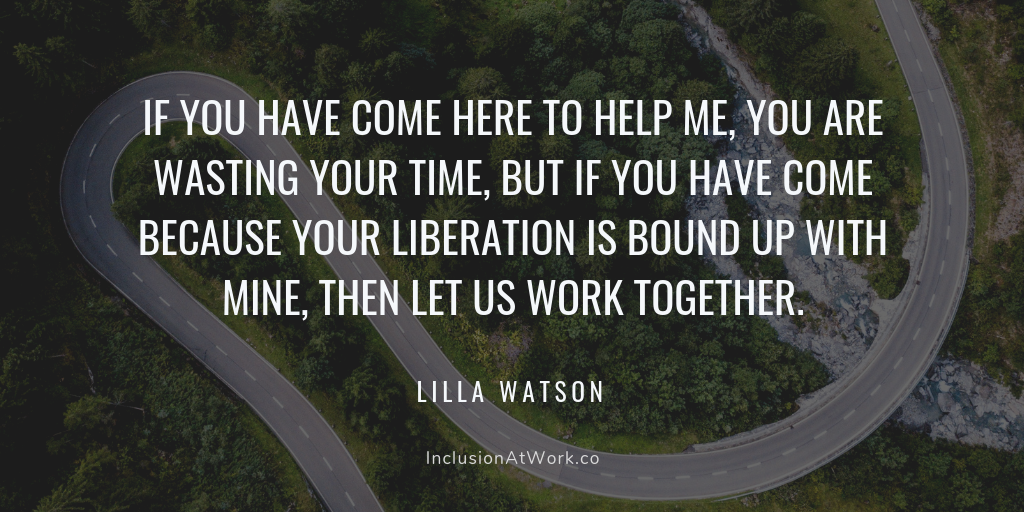The white dude’s dilemma in championing diversity
"As a white guy, is it my place to call out how my colleagues' diversity efforts could be better?"

Submit your own question about Diversity & Inclusion here and get notified about future new posts here!
∗ ∗ ∗
Dear Inclusion at work,
As a college-educated straight, able-bodied, white 20-something man in tech, I sometimes struggle to raise concerns about diversity & inclusion. Specifically, I get concerned when some of my affluent, straight, white, young, female colleagues organize "women in tech" events which only attract others in the exact same demographic. They don't seem to care about intersectionality.
I've read the research on how white feminism can sometimes make matters worse for women of color, and follow the writings of people like Erica Baker closely. Part of me wants to be strong in my view that these other groups should not be ignored. On the other hand, I can't help but ask myself, "do I really have the right to participate in this conversation, since I don't even know what it's like to identify as a woman?" I certainly wouldn't want to isolate or offend anyone in the process. How would you advise me to approach these kinds of conversations?
-Confused Ally
Dear Confused Ally,
Congratulations, you’ve reached a key milestone in your D&I journey. You’ve started to learn about privilege, oppression, and intersectionality. And now, you are trying to figure out how to practice good allyship. There’s no simple, step-by-step guide for applying this knowledge, but I do want to recognize that developing this level of understanding is an important first step.
In college when I first discovered the language of intersectionality and oppression, I didn’t know how to apply it, especially in my predominantly white, upper middle-class environment. So I did what many young black women do: I stopped chemically straightening my hair and let my natural hair grow out. I read everything by bell hooks that I could get my hands on and quoted it incessantly. Every chance I got, I jumped to “educate” my white friends about the white-supremacist, capitalist patriarchy. In short, I was well-intentioned but also, a little bit insufferable.
Confused Ally, I say this to acknowledge that it’s one thing to absorb insights from brilliant people like my colleague and friend, Erica Baker. It’s another challenge entirely to apply your learnings to your lived experience. In our culture, the most visible and glamorized model of “allyship” for white cis-men is acting as a savior. But “saving” centers white men as the central agents of change and arbiters of morality, thereby reinforcing the same system of oppression and privilege.
Even with the best intentions, it’s especially easy for white men to fall into the trap of thinking that “saving” is the only way to practice allyship. While it’s tempting to save your female coworkers by explaining intersectionality, it doesn’t actually lead to more inclusion. Mansplaining how to build spaces for women is inadvertently using the language of oppression as another tool of oppression.

So yes, your observations are probably correct – activities billed as helping women in tech often fall short of helping all women. But criticizing your coworkers’ women-only spaces is unlikely to prompt the kind of change you want to see. These spaces, albeit not perfect, do take a lot of work to bring to life. So even if you can see what’s wrong with them, I encourage you to be more curious, rather than prescriptive.
You could ask a female colleague about these women-only spaces. This conversation doesn’t need to take the form of “your events are terrible and don’t include women of color,” Instead, you can start more broadly – ask her what she enjoys about her work, what challenges she faces, and truly, try to engage in active listening. This conversation isn’t about anyone educating anyone, but just getting to know the person across from you.
From that, you may learn of entirely new ways to better support your colleagues. It may look like offering to secure funding, setting up accessibility accommodations, or talking to your male coworkers about how they can better support inclusion. The key is to assist rather than trying lead some new initiative.
Hungry for more stories about Diversity & Inclusion?
Subscribe to get new posts delivered to your inbox! 📩
But maybe your invitations for coffee won’t be as enthusiastically accepted as you expect. While this might be painful, it indicates that your current practice of allyship doesn’t resonate with your female coworkers yet. Rather than thinking of this as a failure, this is an opportunity for reflection.
As you go on your own journey of advocacy, you will undoubtedly make some missteps (we all do) but the failures don’t mean that you should stop trying – rather, the failures mean that you’re making progress. The important thing is to learn from your mistakes. And that, Confused Ally, is not easy and takes time.
While studying up on D&I theory is important, the hard work of allyship is applying that knowledge to actually show up for the humans around you. I know you’re trying to do that, just remember that it won’t take a single conversation, but an accumulation of small daily actions. That’s why allyship is something we practice every day, rather than something we claim as an identity. I look forward to having you on the journey of learning and fighting for inclusivity and equity with me.
Yours,
Bukky
Further Reading
- Guide to Allyship
- How to Be an "Ally" to an ERG by Jill Wetzler
- Recommended Reading for Allies from the Etsy team
- Moving Past Privilege Guilt from Jamie Utt, Everyday Feminism
Thanks to Jen Kim for her ever insightful edits 💛
Images via Yogi Purnama and Ludovic Fremondiere

